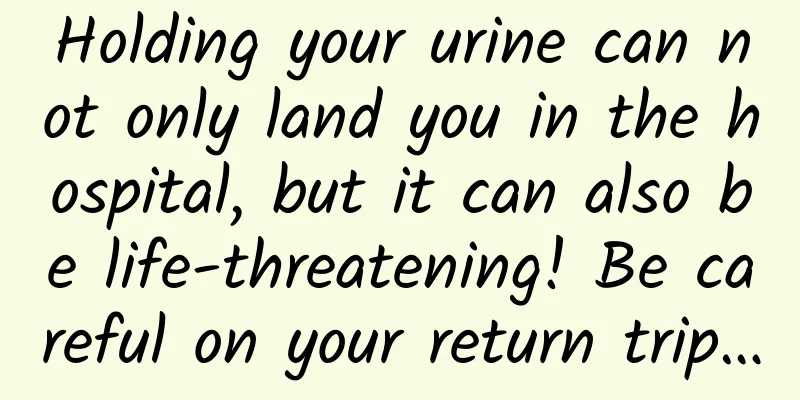Holding your urine can not only land you in the hospital, but it can also be life-threatening! Be careful on your return trip…

|
Expert of this article: Li Tian, Chief Physician, Fifth Affiliated Hospital of Guangzhou Medical University Today is the last day of the National Day holiday and many people have started their journey back home. But what should I do if I need to urinate urgently during the return journey? For example, traffic jams on highways, queues for toilets on trains... Some people may say, it’s not a big deal, just hold it in and wait until you can go to the bathroom. However, some people ended up being admitted to the hospital after holding their breath for a long time. There have been news reports of this in previous years. In fact, everyone has had the experience of holding urine to some extent. Why can holding urine send people to the hospital? Are the consequences so serious? In fact, the consequences of holding urine are much more serious than many people can imagine. Today we will explain to you why you should cherish your health and refuse to hold urine! Why do people end up in the hospital because they hold their urine? Recently, the author treated a 69-year-old male patient who had been holding his urine for more than 8 hours on the highway. After going to the bathroom, he found that although his lower abdomen was bulging, he could not urinate a drop. When he came to see the doctor, the patient looked painful and was restless. After examination, it was found that his bladder was overfilled with urine and could not be discharged normally. This is a typical case of urinary retention. So the author quickly catheterized the patient, and soon the drainage bag was filled with 900 ml of urine. Obviously, accumulating 900 ml of urine is a very painful process, so what is this process like? What is the process of holding urine? Human urine comes out of the kidneys and enters the bladder through the ureters for temporary storage. Holding urine means that the physiological capacity of the bladder exceeds the standard. Generally speaking, the bladder can hold 200~300mL of urine, at which time the human body does not feel an obvious urge to urinate. When the urine volume approaches 300-500ml, the bladder's right-hand man, the internal urethral sphincter, which is equivalent to the "gate" for releasing water, begins to work. When it senses the increasing amount of urine, it starts to work under the drive of instinctive reflex, and the brain receives the transmission signal, reminding people that they have the "urge to urinate" and have the urge to prepare to go to the bathroom. If the conditions do not allow urination, the brain will give the command based on the urge to urinate: hold it! The "holding urine" begins from then on. 500ml, 600ml, 700ml, the external urethral sphincter has been contracting and "holding on", and the brain has been suggesting: continue to stay contracted! Until the urine in the bladder accumulates to the "warning line" - 800ml, at this time, there are often two outcomes: Either the sphincter loses control and opens unexpectedly, releasing the fluid and causing all efforts to fail; Or you finally find the bathroom, but find that the sphincter is stiff due to continuous contraction, and you can't urinate even if you want to. At the same time, the "detrusor muscle" on the inner wall of the bladder will show various "disobedience", causing pain and discomfort... Both situations are terrible, right? In fact, if you hold your urine for a long time, the consequences may be even more serious. What are the dangers of holding urine for a long time? In fact, holding urine for a long time not only damages the bladder, but also affects some other organs and even endangers life. Causes urinary retention. The bladder is like an elastic balloon. If you hold urine for a long time, the bladder will continue to passively expand, the muscle fibers will be stretched apart, the detrusor muscle will be overly fatigued, and the elastic contraction force will be weakened, so you will not be able to urinate when you want to urinate. Cause urinary tract infection and prostate disease. Holding urine for a long time will cause the bladder to swell, the blood vessels in the bladder wall to be compressed, the bladder mucosa to become thinner and ischemic, and it is easy to be damaged. Bacteria outside can easily take advantage of the situation to enter and multiply, increasing the risk of urinary tract infection. Holding urine for a long time will also cause the prostate gland to shrink, affecting the blood circulation of the prostate, causing chronic congestion and edema, leading to increased urethral pressure, aggravating the congestion of prostatic fluid, and causing prostatitis, premature ejaculation, hematospermia, etc. Affects kidney function. Holding urine for a long time will increase the pressure in the bladder. Over time, urine can flow back from the ureteral opening, causing hydronephrosis, affecting kidney function, and even causing uremia. Induce cardiovascular and cerebrovascular diseases. For patients with hypertension and coronary heart disease, long-term urine retention and emotional excitement can cause sympathetic nerve excitement, leading to increased blood pressure, faster heart rate, and increased myocardial oxygen consumption, which may induce myocardial infarction or cause cerebral vascular rupture and bleeding, and may also cause sudden death. Causes urinary syncope. If you hold your urine for too long and then empty it all at once, the bladder pressure will drop dramatically, and the vagus nerve reflex will be too slow, resulting in a drop in blood pressure and a temporary lack of blood supply to the brain, resulting in black spots in front of the eyes and dizziness. Some patients may faint suddenly without any warning. Cause bladder rupture. Holding urine for too long can cause the bladder wall to expand and thin. If an external force hits it at this time, the bladder may rupture. Once urine enters the abdominal cavity, it is easy to cause abdominal infection and even endanger life. How to avoid these possible injuries? Whether on the way back or at other times, you should be careful to avoid the harm caused by holding your urine. The correct methods include: Empty your bladder before going out, and reduce the amount of water you drink when it is inconvenient to go to the bathroom. This is especially true for elderly men with prostate hyperplasia, who should pay more attention and learn to relax. It is best to eat something before drinking water, as food will absorb water like a sponge and delay the excretion time. Look up a map in advance and determine where you can go to the bathroom easily, such as service areas and gas stations on the highway. If you have already found a bathroom, it is recommended that you go there to empty your bladder again regardless of whether you feel like urinating or not, especially for the elderly with underlying cardiovascular and cerebrovascular diseases. If you really cannot guarantee time on the road, you can prepare diapers in advance. At least it looks more decent and can save you the pain of holding your urine. In summary Holding urine not only damages the bladder It will also affect your health So don't make a habit of holding your urine. Even when it is inconvenient to go to the bathroom Also, without violating public morality Reasonable solution to "urgent need"! |
<<: What kind of weather will a typhoon bring? What kind of damage will a typhoon cause?
>>: What is silicone oil eye? Should I remove the silicone oil or not?
Recommend
What are the benefits of eating sardines? Are sardines marine fish?
Some canned foods we eat in our daily lives, such...
Is there any relationship between intestinal flora and baby’s obesity?
There is a very close relationship between intest...
Can I wean during menstruation?
For many breastfeeding mothers, when their childr...
Why can't stainless steel be put into the dishwasher? What are the types of dishwashers?
In fact, dishwashers are not yet popular in every...
Common knowledge about dental cleaning
1. What is teeth cleaning? In the medical field, ...
Blisters on hands during early pregnancy
In the early stages of pregnancy, some female fri...
Irregular menstruation after medical abortion
Irregular menstruation is a common gynecological ...
What is the reason for the breast to squeeze out clear liquid?
Some women will have some special conditions in t...
What are the symptoms when you are pregnant?
Every woman has different symptoms when she first...
What is the reason why Impatiens does not grow leaves? How to solve the problem of Impatiens not growing leaves
Impatiens is a very common flower in life. Many f...
To detect prostate cancer early, you need to know these screening methods!
Prostate cancer is one of the most common maligna...
A few simple tips to help girls grow taller
Most girls are relatively short, and many women w...
How long can you live with vulvar leukoplakia?
Vulvar leukoplakia is a common gynecological dise...
Hidden ability: can intestinal bacteria “reverse aging” and make us smarter and younger?
Recently, scientists discovered for the first tim...
I get hungry very quickly during early pregnancy
During pregnancy, many women experience many chan...









